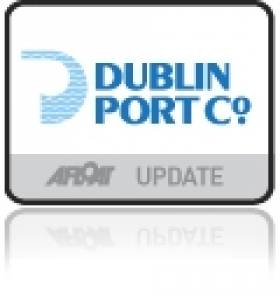Displaying items by tag: Guinness Stouttankers
Former Dundalk Dredger Sold in Dublin Port
#DUBLIN PORT-The former Dundalk Port Company grab-hopper dredger Hebble Sand (1963/757grt), which has been laid-up in Dublin since last Summer, was sold to new owners a month ago, writes Jehan Ashmore.
She remains berthed at the Bulk Jetty, Alexandra Basin, where she arrived from the Co. Louth port on 14 July, two days after the assets, liabilities and operations of Dundalk Port Company were transferred to Dublin Port Company by an order of statutory instrument. Against this background, Dublin Port Company decided to divest in the business of dredging resulting in placing the veteran vessel for sale.
During her career in Drogheda, she was the only dredger to be operated and owned by a port company apart from the suction-trailer dredger Lough Foyle (1979/868grt) operated by Londonderry Port & Harbour Commissioners.
Hebble Sand, registered in Dundalk has retained her original name since her launch from Richard (Shipbuilders) of Lowestoft for British Dredging. She has been kept in good condition considering a career nearing five decades. To read some of her last contracts undetaken outside her homeport, click HERE.
From a distance some people have mistaken Hebble Sand (PHOTO) to the last of the 'Guinness ships, as she bores a resemblance to the final custom-built stout tanker Miranda Guinness ( PHOTO), taken on her farewell sailing. The vessels shared a similar red funnel and black funnel, a roomy sized superstructure painted in cream above and a dark blue hull. To read more about the last of the brewery tanker-fleet click HERE.






























































